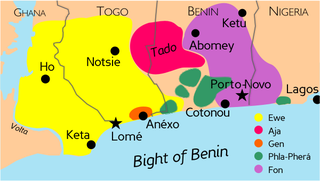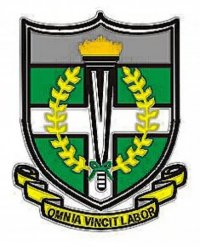
Francis Kwame Nkrumah was a Ghanaian politician, political theorist, and revolutionary. He served as Prime Minister of the Gold Coast from 1952 until 1957, when it gained independence from Britain. He was then the first Prime Minister and then the President of Ghana, from 1957 until 1966. An influential advocate of Pan-Africanism, Nkrumah was a founding member of the Organization of African Unity and winner of the Lenin Peace Prize from the Soviet Union in 1962.

Ewe is a language spoken by approximately 5 million people in West Africa, mainly in Ghana and Togo. Ewe is part of a group of related languages commonly called the Gbe languages. The other major Gbe language is Fon, which is mainly spoken in Benin. Like many African languages, Ewe is tonal as well as a possible member of the Niger-Congo family.

Keta is a coastal town in the Volta Region of Ghana. It is the capital of the Keta Municipal District.
Bediako Asare is a Ghanaian journalist and author, initially from Ghana. He began his career working on local newspapers, then relocated to Dar es Salaam, Tanzania in 1963, to help launch The Nationalist newspaper.

Kwame Nkrumah University of Science and Technology (KNUST), commonly known as UST, Tech or Kwame Tech, is a public university located in Kumasi, Ashanti region, Ghana. The university focuses on science and technology. It is the second public university established in the country, as well as the largest university in the Ashanti Region of Ghana.
The Akan people of Ghana, Côte d'Ivoire and Togo frequently name their children after the day of the week they were born and the order in which they were born. These "day names" have further meanings concerning the soul and character of the person. Middle names have considerably more variety and can refer to their birth order, twin status, or an ancestor's middle name.
Camara Laye was a writer from Guinea. He was the author of The African Child, a novel based loosely on his own childhood, and The Radiance of the King. Both novels are among the earliest major works in Francophone African literature. Camara Laye later worked for the government of newly independent Guinea, but went into voluntary exile over political issues.
Theresa Tomlinson is an English writer for children, mainly of historical fiction. She advocates giving children "the opportunity to consider many different role models and ways of life, so that they can make up their own minds about what is right for them."

St. Augustine’s College is an all-male boarding academic institution in Cape Coast, Ghana. As the first catholic school established in Ghana, the school started at Amissano, a village near Elmina, in 1930. The Roman Catholic institution was established to serve as a training college and seminary. The school was named after St. Augustine of Hippo. The motto of the college is Omnia Vincit Labor, meaning "Perseverance conquers All". The school has a total of 12 houses.
Francis Bebey was a Cameroonian musicologist, writer, composer, and broadcaster.
Colonel Kwame R. M. Baah was a soldier and politician. He was the Ghanaian foreign minister between 1972 and 1975.

Francis Kofi Ampenyin Allotey was a Ghanaian mathematical physicist. Together with Daniel Afedzi Akyeampong, he became the first Ghanaian to obtain a doctorate in mathematical sciences, earned in 1966.
Francis Selormey was a Ghanaian novelist, teacher, scriptwriter and sports administrator.
This Earth, My Brother is a 1971 novel by Ghanaian novelist Kofi Awoonor published. It was later republished by Heinemann as part of the influential African Writers Series.
Akua Asabea Ayisi was a feminist, former High Court Judge and the first female Ghanaian journalist. During the rise of the Ghanaian independence movement, Akua Asabea Ayisi trained as a journalist with Mabel Dove-Danquah and Kwame Nkrumah, who would later become the country's first prime minister and president.
Anthony Hugh Selormey is a Ghanaian soldier and politician. He was one of the members of the National Redemption Council (NRC) which overthrew the Progress Party government of Kofi Abrefa Busia on 13 January 1972. He also served briefly in the Supreme Military Council government which followed the NRC.

John Osei Tutu Agyeman also known by the name Jot Agyeman is a Ghanaian author, actor, playwright and television personality.







